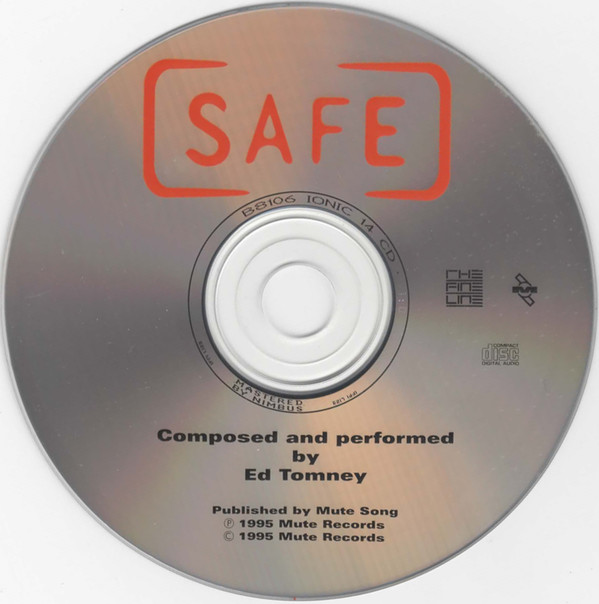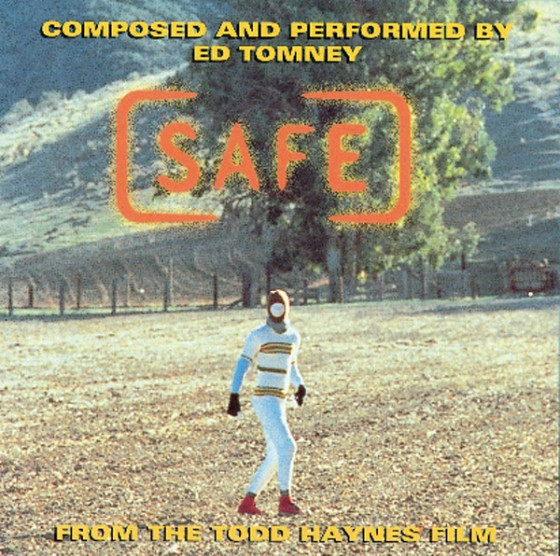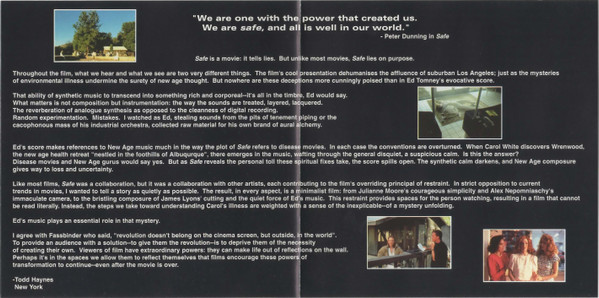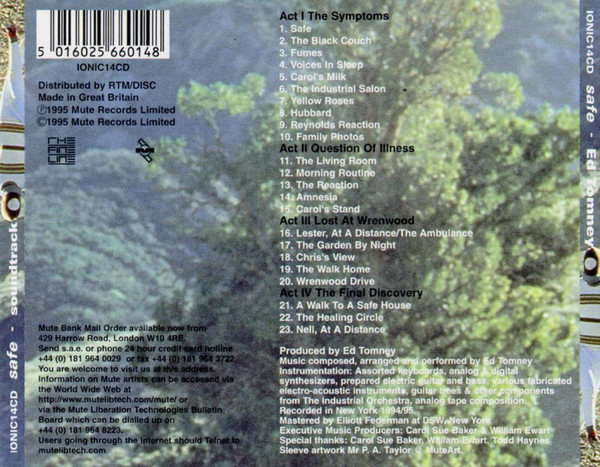Ed Tomney - Safe Soundtrack
Table of Contents
Download
Filename: ed-tomney-safe-soundtrack.zip- MP3 size: 112.7 mb
- FLAC size: 1262.7 mb
Tracks
| Track | Duration | Preview |
|---|---|---|
| Yellow Roses | 3:03 | |
| Safe | 3:23 | |
| Reynolds Reaction | 1:58 | |
| A Walk To A Safe House | 2:27 | |
| Chris's View | 1:57 | |
| Hubbard | 1:46 | |
| The Healing Circle | 3:08 | |
| Nell, At A Distance | 2:28 | |
| Amnesia | 3:43 | |
| The Living Room | 1:48 | |
| The Industrial Salon | 2:26 | |
| Carol's Milk | 1:41 | |
| Lester, At A Distance/The Ambulance | 3:43 | |
| Morning Routine | 2:57 | |
| Voices In Sleep | 2:12 | |
| The Walk Home | 2:05 | |
| Family Photos | 4:37 | |
| Carol's Stand | 2:37 | |
| The Black Couch | 3:09 | |
| Fumes | 2:58 | |
| The Reaction | 2:08 | |
| Wrenwood Drive | 2:45 | |
| The Garden By Night | 2:44 |
Images




Catalog Numbers
IONIC 14 CDLabels
The Fine LineListen online
- lyssna på nätet
- kuunnella verkossa
- ascolta in linea
- online luisteren
- écouter en ligne
- lytte på nettet
- escuchar en línea
- online anhören
- ouvir online
Formats
- CD
- Album
Companies
| Role | Company |
|---|---|
| Phonographic Copyright (p) | Mute Records Ltd. |
| Copyright (c) | Mute Records Ltd. |
| Distributed By | RTM |
| Mastered At | DSW Mastering Studios |
| Designed At | MuteArt |
Credits
| Role | Credit |
|---|---|
| Composed By | Ed Tomney |
| Arranged By | Ed Tomney |
| Performer | Ed Tomney |
| Producer | Ed Tomney |
| Executive-Producer | Carol Sue Baker, William Ewart |
| Mastered By | Elliott Federman |
| Sleeve | Mr P. A. Taylor @ MuteArt |
| Artwork | Mr P. A. Taylor @ MuteArt |
Notes
- Captions on the front cover:
- Composed and Performed by Ed Tomney
- From the Todd Haynes Film
- Instrumentation: Assorted keyboards, analog & digital
- synthesizers, prepared electric guitar and bass, various fabricated
- electro-acoustic instruments, guitar trees & other components
- from The Industrial Orchestra, analog tape composition.
- Recorded in New York 1994/95.
- Mastered by Elliott Federman at DSW, New York
- Executive Music Producers: Carol Sue Baker & William Ewart
- Special thanks: Carol Sue Baker, William Ewart, Todd Haynes
- Sleeve artwork Mr P. A. Taylor @ MuteArt.
- Distributed by RTM/DISC
- Made in Great Britain
- ℗1995 Mute Records Limited
- ©1995 Mute Records Limited
- Information on Mute artists can be accessed via
- the World Wide Web at
- http://www.mutelibtech.com/mute/ or
- via the Mute Liberation Technologies Bulletin
- Board which can be dialled up on
- +44 181 964 8223.
- Users going through the Internet should Telnet to
- mutelibtech.com
Barcodes
- Barcode: 5 016025 660148
- Other (Catalog Number on Back Cover): IONIC14CD
About Ed Tomney
Ed Tomney is an American film composer, experimental musician, multi-instrumentalist, sound designer, installation artist and producer, graduate of , who is based in New York. Throughout his diverse career, Tomney had composed and recorded music for feature films and documentaries, theater, dance productions and performances, radio and television, as well as contributed guitar, keyboards, percussion and electronics on numerous releases, and designed site-specific acoustic installations at various museums and galleries around the world. His compositional technique is rooted both in contemporary classical and abstract ambient, blending Eastern and Western music traditions. Tomney often incorporates elements of spoken word and multi-linguistic sound collages in his scores and performances.
In 1977, Ed Tomney released with band. The 12" single was produced by (of fame), and published through his label Soon after, Ed Tomney fronted a power pop quartet as guitarist with three members of : (appearing as keyboardist), ex-Modern Lovers bassist , and on drums and percussion. The band released their debut album in 1981, which was reworked and re-issued with different tracklist as LP one year later.
In the early eighties, Tomney joined band, formed by . At the time, Morrow was still fronting his main band, The Individuals, which finally broke up in 1983. Rage To Live, hailed by some critics as the originators of 'Hoboken Sound' (alongside with , and ), released two albums through . Ed Tomney also played guitar on 's debut eponymous 12" EP and Arthur Russell's album.
His first experimental album was produced in collaboration with artist , who started counting continuously from zero in ascending order in 1969 and by the eighties passed a 3,000,000 mark. In 1987, Borofsky and Ed Tomney released Tomney wrote custom software to transform these numbers into a vocal composition. Using a collection of various tones sung by Borofsky, Ed Tomney arranged this computer-generated score in Opus for Voice, Movement One, Two Three.
Around the same period, Ed Tomney formed The Industrial Orchestra, a unique man-machine ensemble consisting of eight 'guitar trees' sonic sculptures built from pawn-shop guitars rigged on steel stands and played by a robotic arm, controlled by a custom-built software. The guitar trees are accompanied by six human musicians and pre-recorded ambient soundscapes, videotape collages, field recordings, etc. Industrial Orchestra had been performing concerts/site-specific acoustic performances at various museums and theatre venues across the US. In March 1988, the Industrial Orchestra staged a live concert at Neuberger Museum of Art in New York. Ed Tomney found inspiration for his human-computer interaction orchestra in the visionary work of Soviet avant-garde composer . In 1922, decades ahead of contemporary musique concrete movement and sound installation art, Avraamov conducted a colossal Symphony Of Sirens, featuring an entire port city of Baku: ship horns, steam locomotives, factory sirens, two batteries of artillery and few hundred soldiers, trucks, seaplanes, an orchestra of pitched whistles and several enormous choirs.
In 1995, Ed Tomney released his debut solo album a soundtrack for ' cult environmentalist psychodrama Safe, published by Mute sub-label . This multilayered abstract ambient album, reminiscent of critically acclaimed works by , , , and , features assorted analog and digital synthesizers, analog tape composition, DIY electroacoustic tools and instruments, prepared electric guitar and bass, as well as guitar trees and other components from The Industrial Orchestra.
Tomney had been collaborating with many US independent film-makers, and composed music score for ' directorial debut Guncrazy, Dracula Rising by , 's Persons Unknown, 's Jailbait for Belladonna Productions, Getting Off by Julie Lynch, Spin The Bottle and Bobby G. Can't Swim for Cineblast, Exit 8A premiered at Sundance Festival, and b-movie Carnosaur 2 in 1995. He also contributed source music for 's JFK (1991), and created special sound design on 's Amityville: A New Generation soundtrack (1993). Ed Tomney had been producing soundtracks for various major broadcasting networks, and worked on American Chronicles by and other notable TV series, as well as numerous science, history and documentary specials for Discovery, PBS, NOVA, and History Channel.
Some of his recent appearances in the experimental/electronic realm include a featuring on 's album, released by in 2006, as well as a live concert with at in New York in Feb 2008.
Name Vars
- E. Tomney
- Tomney
